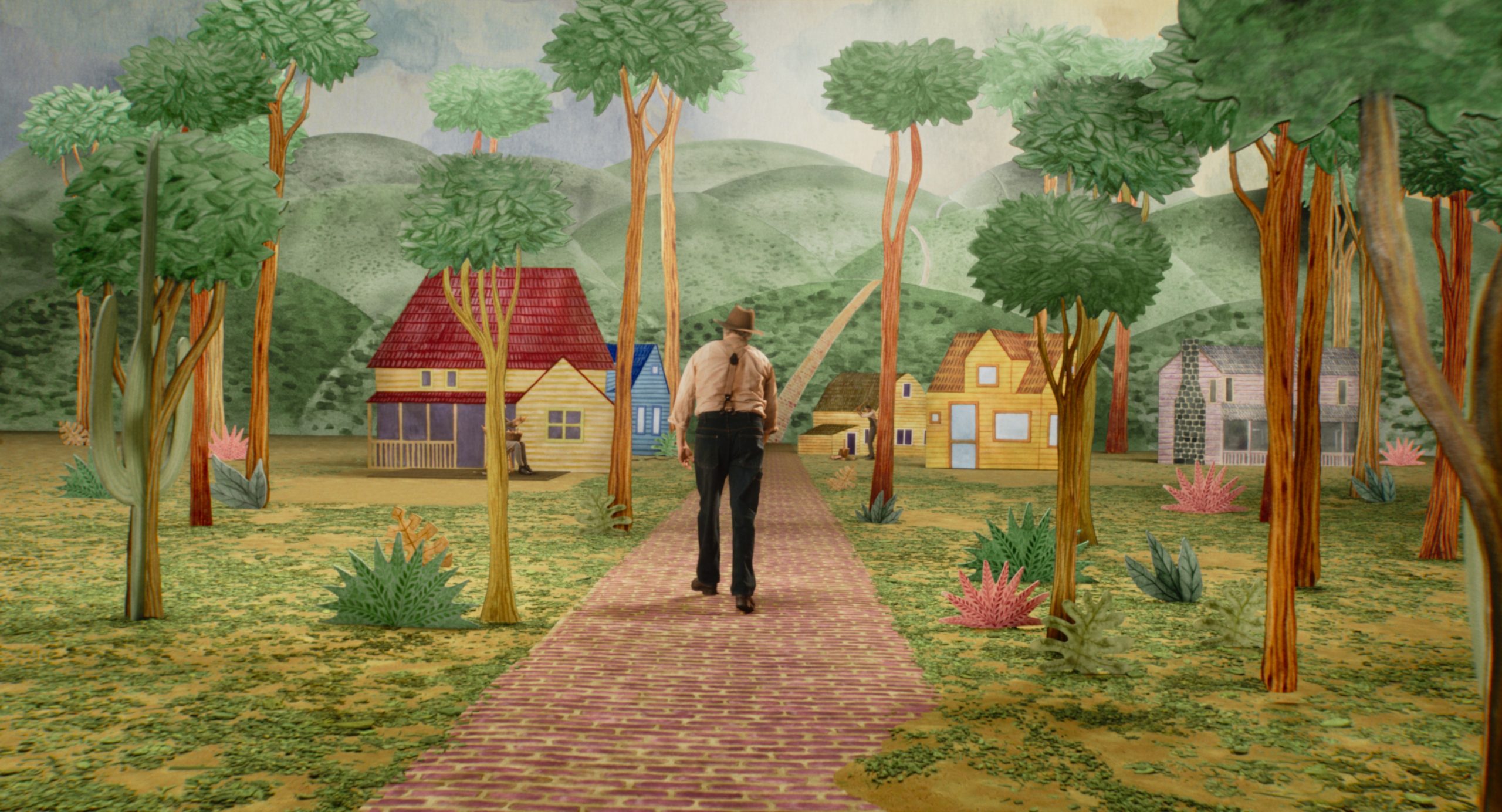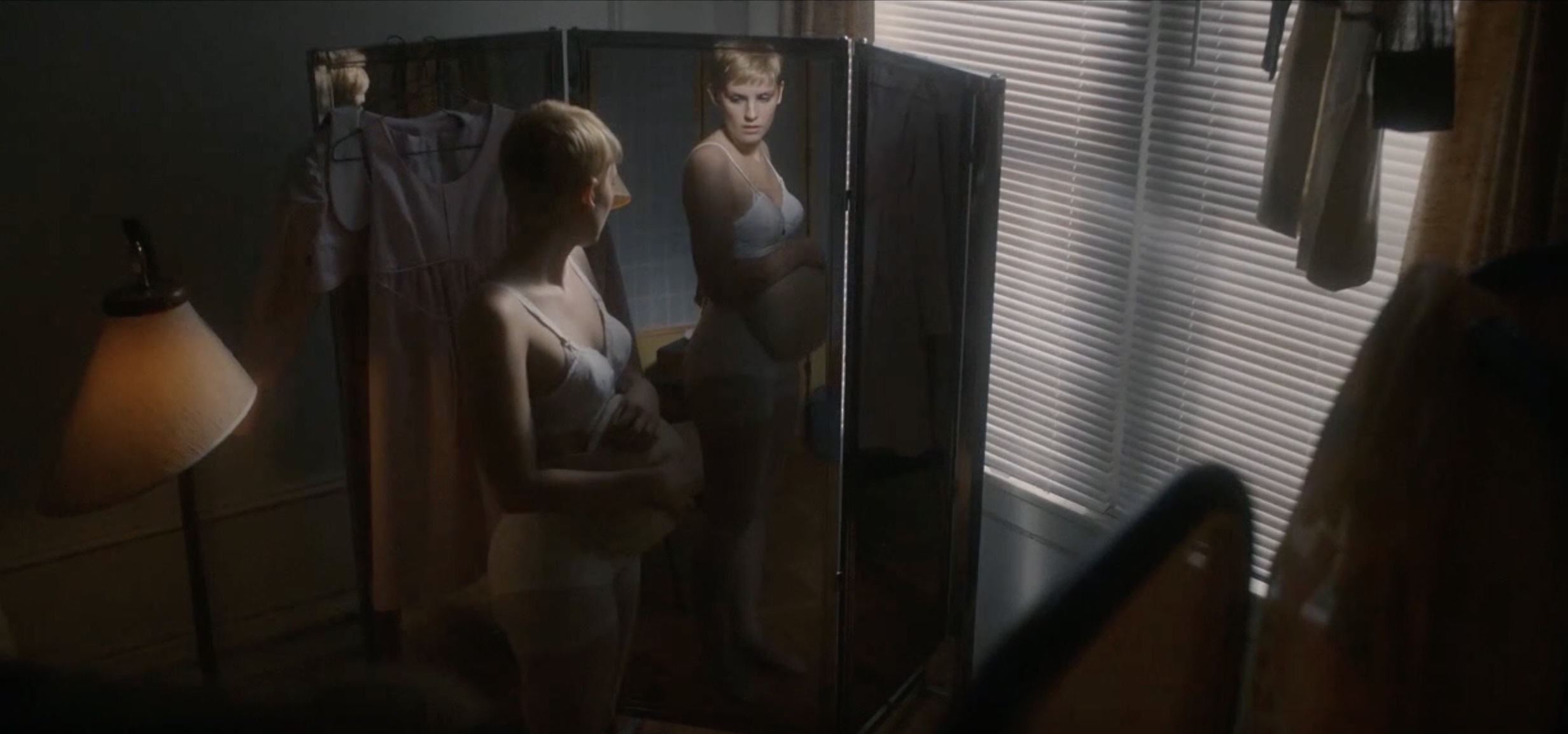Reviews
‘Beau is Afraid’ Review – Ari Aster’s Latest is a Surreal Odyssey Untethered from Genre or Reality

“Nightmare comedy” is the perfect phrase to describe Ari Aster’s Beau is Afraid, a darkly funny Kafkaesque odyssey that defies easy categorization. The writer and director of Hereditary and Midsommar is back with yet another emotionally complex saga, this one his most ambitious yet. The visionary combs his literary and cinematic influences, infusing them into a surreal, emotionally tumultuous journey that’ll prove divisive for its cryptic, unhurried storytelling.
Beau Wassermann (Joaquin Phoenix) lives with constant unrelenting anxiety smack in the middle of a chaotic city. His ramshackle apartment with thin walls and unkind neighbors seems peaceful compared to the violent chaos outside in the streets. Yet, the most significant source of Beau’s emotional turmoil stems from his strained relationship with his mother, Mona (Patti LuPone). A planned trip home instills panic, prompting Beau’s longtime therapist (Stephen McKinley Henderson) to prescribe medication and coping measures. The sudden, shocking news that Beau’s mother died sends him reeling, giving him enough courage to face his fears and embark on an existential voyage home.

Photo credit: A24
Aster showcases his warped sense of humor in catapulting Beau, a neurotic and ill-equipped protagonist, into a hero’s journey. The filmmaker creates no shortage of impressive sight gags and cringe moments to present how terrifying the world appears to Beau, who lives in constant fear and paranoia. Even the act of crossing the street to buy a bottle of water becomes a nearly insurmountable task as various denizens and obstacles descend upon Beau. Not even Beau’s sanctuary feels safe; hostile unseen neighbors and a pesky Brown Recluse problem highlight his constant instability. Aster wrings a macabre sense of humor through the impressive depth of field here.
The filmmaker fills the frame with background characters and violent acts that give viewers much to take in, instilling laughter and shock as it ensures its on-edge hero feels suffocated by the madness. Phoenix’s primal portrayal ensures Beau’s neurosis is matched by a sympathetic vulnerability that maintains rooting interest as Aster throws every imaginative, insane barrier in Beau’s path. And it gets increasingly wilder as it goes.
The more this peculiar reflection of our reality throws at Beau, the more he retreats inward, becoming passive to the world’s eccentricities as he finds himself instead unearthing repressed memories and past choices that led to his bizarre predicament in the present. Aster propels his lead through an audacious visual odyssey that employs various techniques and styles to mark the filmmaker’s most impressive effort yet. Animators Joaquín Cociña and Cristóbal León, behind the eerie animated horror feature The Wolf House, present a stunning second act sequence that sees Beau working through some of his absent father issues. It’s another example of how Aster manipulates form and technique to explore Beau’s fragile psyche. The almost soothing introspection of Beau’s daddy issues contrasts with the profoundly disconcerting terrors mined from his unhealthy relationship with an overbearing mother.

Photo credit: A24
It’s here where Aster wields his horror with a sharpness. Flashbacks of a young Beau with a younger yet no less controlling Mona (Zoe Lister-Jones) underscore the “nightmare” part of this “nightmare comedy.” As Mona tucks her son into bed, a monologue about inherited traits becomes ominous as only the kaleidoscopic colors of his bedside projector lamp light her face in the pitch-black room. Past and present bleed together in true nightmarish fashion, slowly building the nightmarish puzzle that is Beau’s relationship with his mother.
Beau is Afraid exemplifies Aster at his most daring and unrestrained. Beau’s journey home brings no shortage of physical comedy and suffering, but it’s more interested in the internal voyage and traversing the murky depths of Beau’s id. A three-hour runtime reliant upon a methodical, sometimes meandering, unpacking of Oedipal themes through symbolism and visual form over conventional storytelling makes Aster’s latest the most ambitious yet least commercially appealing. The cryptic unpacking of a life bogged down by guilt and repression comes with no lack of jarring visuals and moments bolstered by riveting performances and a seamless blending of style, form, and genres.
Aster drops viewers directly into Beau’s head, resulting in a wildly ambitious odyssey through one warped mind as it navigates Beau’s memories, dreams, nightmares, and fears far removed from reality. It doesn’t just play with one genre, but all of them, and often at once. That Beau is Afraid remains steadfastly untethered to realism makes for Aster’s most divisive effort yet, but those willing to ride the wave of genre and mind-bending insanity will find themselves rewarded by a profoundly imaginative and audacious artistic experience unafraid to explore unwieldy themes through a Kafkaesque odyssey as dementedly funny as it is often horrifying.
Beau is Afraid releases in limited theaters on April 14 before going wide on April 21, 2023.


Reviews
“AHS: Delicate” Review – “Little Gold Man” Mixes Oscar Fever & Baby Fever into the Perfect Product

‘AHS: Delicate’ enters early labor with a fun, frenzied episode that finds the perfect tone and goes for broke as its water breaks.
“I’ll figure it out. Women always do.”
American Horror Story is no stranger to remixing real-life history with ludicrous, heightened Murphy-isms, whether it’s AHS: 1984’s incorporation of Richard Ramirez, AHS: Cult’s use of Valerie Solanas, or AHS: Coven’s prominent role for the Axeman of New Orleans. Accordingly, it’s very much par for the course for AHS: Delicate to riff on other pop culture touchstones and infinitely warp them to its wicked whims. That being said, it takes real guts to do a postmodern feminist version of Rosemary’s Baby and then actually put Mia Farrow – while she’s filming Rosemary’s Baby, no less – into the narrative. This is the type of gonzo bullshit that I want out of American Horror Story! Sharon Tate even shows up for a minute because why the hell not? Make no mistake, this is completely absurd, but the right kind of campy absurdity that’s consistently been in American Horror Story’s wheelhouse since its inception. It’s a wild introduction that sets up an Oscar-centric AHS: Delicate episode for success. “Little Gold Man” is a chaotic episode that’s worth its weight in gold and starts to bring this contentious season home.
It’d be one thing if “Little Gold Man” just featured a brief detour to 1967 so that this season of pregnancy horror could cross off Rosemary’s Baby from its checklist. AHS: Delicate gets more ambitious with its revisionist history and goes so far as to say that Mia Farrow and Anna Victoria Alcott are similarly plagued. “Little Gold Man” intentionally gives Frank Sinatra dialogue that’s basically verbatim from Dex Harding Sr., which indicates that this demonic curse has been ruffling Hollywood’s feathers for the better part of a century. Anna Victoria Alcott’s Oscar-nominated feature film, The Auteur, is evidently no different than Rosemary’s Baby. It’s merely Satanic forces’ latest attempt to cultivate the “perfect product.” “Little Gold Man” even implies that the only reason that Mia Farrow didn’t go on to make waves at the 1969 Academy Awards and ends up with her twisted lot in life is because she couldn’t properly commit to Siobhan’s scheme, unlike Anna.
This is easily one of American Horror Story’s more ridiculous cold opens, but there’s a lot of love for the horror genre and Hollywood that pumps through its veins. If Hollywood needs to be a part of AHS: Delicate’s story then this is actually the perfect connective tissue. On that note, Claire DeJean plays Sharon Tate in “Little Gold Man” and does fine work with the brief scene. However, it would have been a nice, subtle nod of continuity if AHS: Delicate brought back Rachel Roberts who previously portrayed Tate in AHS: Cult. “Little Gold Man” still makes its point and to echo a famous line from Jennifer Lynch’s father’s television masterpiece: “It is happening again.”
“Little Gold Man” is rich in sequences where Anna just rides the waves of success and enjoys her blossoming fame. She feels empowered and begins to finally take control of her life, rather than let it push her around and get under her skin like a gestating fetus. Anna’s success coincides with a colossal exposition dump from Tavi Gevinson’s Cora, a character who’s been absent for so long that we were all seemingly meant to forget that she was ever someone who was supposed to be significant. Cora has apparently been the one pulling many of Anna’s strings all along as she goes Single White Female, rather than Anna having a case of Repulsion. It’s an explanation that oddly works and feeds into the episode’s more general message of dreams becoming nightmares. Cora continuing to stay aligned with Dr. Hill because she has student loans is also somehow, tragically the perfect explanation for her abhorrent behavior. It’s not the most outlandish series of events in an episode that also briefly gives Anna alligator legs and makes Emma Roberts and Kim Kardashian kiss.

“Little Gold Man” often feels like it hits the fast-forward button as it delivers more answers, much in the same vein as last week’s “Ava Hestia.” These episodes are two sides of the same coin and it’s surely no coincidence that they’re both directed by Jennifer Lynch. This season has benefitted from being entirely written by Halley Feiffer – a first for the series – but it’s unfortunate that Lynch couldn’t direct every episode of AHS: Delicate instead of just four out of nine entries. That’s not to say that a version of this season that was unilaterally directed by Lynch would have been without its issues. However, it’s likely that there’d be a better sense of synergy across the season with fewer redundancies. She’s responsible for the best episodes of AHS: Delicate and it’s a disappointment that she won’t be the one who closes the season out in next week’s finale.
To this point, “Little Gold Man” utilizes immaculate pacing that helps this episode breeze by. Anna’s Oscar nomination and the awards ceremony are in the same episode, whereas it feels like “Part 1” of the season would have spaced these events out over four or five episodes. This frenzied tempo works in “Little Gold Man’s” favor as AHS: Delicate speed-runs to its finish instead of getting lost in laborious plotting and unnecessary storytelling. This is how the entire season should have been. Although it’s also worth pointing out that this is by far the shortest episode of American Horror Story to date at only 34 minutes. It’s a shame that the season’s strongest entries have also been the ones with the least amount of content. There could have been a whole other act to “Little Gold Man,” or at the least, a substantially longer cold open that got more out of its Mia Farrow mayhem.
“Little Gold Man” is an American Horror Story episode that does everything right, but is still forced to contend with three-quarters of a subpar season. “Part 2” of AHS: Delicate actually helps the season’s first five episodes shine brighter in retrospect and this will definitely be a season that benefits from one long binge that doesn’t have a six-month break in the middle. Unfortunately, anyone who’s already watched it once will likely not feel compelled to experience these labor pains a second time over. With one episode to go and Anna’s potential demon offspring ready to greet the world, AHS: Delicate is poised to deliver one hell of a finale.
Although, to paraphrase Frank Sinatra, “How do you expect to be a good conclusion if this is what you’re chasing?”















You must be logged in to post a comment.